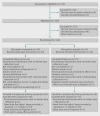Melatonin for sleep problems in children with neurodevelopmental disorders: randomised double masked placebo controlled trial
- PMID: 23129488
- PMCID: PMC3489506
- DOI: 10.1136/bmj.e6664
Melatonin for sleep problems in children with neurodevelopmental disorders: randomised double masked placebo controlled trial
Abstract
Objective: To assess the effectiveness and safety of melatonin in treating severe sleep problems in children with neurodevelopmental disorders.
Design: 12 week double masked randomised placebo controlled phase III trial.
Setting: 19 hospitals across England and Wales.
Participants: 146 children aged 3 years to 15 years 8 months were randomised. They had a range of neurological and developmental disorders and a severe sleep problem that had not responded to a standardised sleep behaviour advice booklet provided to parents four to six weeks before randomisation. A sleep problem was defined as the child not falling asleep within one hour of lights out or having less than six hours' continuous sleep.
Interventions: Immediate release melatonin or matching placebo capsules administered 45 minutes before the child's bedtime for a period of 12 weeks. All children started with a 0.5 mg capsule, which was increased through 2 mg, 6 mg, and 12 mg depending on their response to treatment.
Main outcome measures: Total sleep time at night after 12 weeks adjusted for baseline recorded in sleep diaries completed by the parent. Secondary outcomes included sleep onset latency, assessments of child behaviour, family functioning, and adverse events. Sleep was measured with diaries and actigraphy.
Results: Melatonin increased total sleep time by 22.4 minutes (95% confidence interval 0.5 to 44.3 minutes) measured by sleep diaries (n=110) and 13.3 (-15.5 to 42.2) measured by actigraphy (n=59). Melatonin reduced sleep onset latency measured by sleep diaries (-37.5 minutes, -55.3 to -19.7 minutes) and actigraphy (-45.3 minutes, -68.8 to -21.9 minutes) and was most effective for children with the longest sleep latency (P=0.009). Melatonin was associated with earlier waking times than placebo (29.9 minutes, 13.6 to 46.3 minutes). Child behaviour and family functioning outcomes showed some improvement and favoured use of melatonin. Adverse events were mild and similar between the two groups.
Conclusions: Children gained little additional sleep on melatonin; though they fell asleep significantly faster, waking times became earlier. Child behaviour and family functioning outcomes did not significantly improve. Melatonin was tolerable over this three month period. Comparisons with slow release melatonin preparations or melatonin analogues are required.
Trial registration: ISRCT No 05534585.
Conflict of interest statement
Competing interests: All authors have completed the ICMJE uniform disclosure form at
Figures
Comment in
-
Treatment of sleep disorders with melatonin.BMJ. 2012 Nov 5;345:e6968. doi: 10.1136/bmj.e6968. BMJ. 2012. PMID: 23129489 No abstract available.
References
-
- Meltzer L, Mindell J. Relationship between child sleep disturbances and maternal sleep, mood and parenting stress: a pilot study. J Fam Psychol 2007;21:67-73. - PubMed
-
- Phillips L, Appleton RE. Systematic review of melatonin treatment in children with neurodevelopmental disabilities and sleep impairment. Dev Med Child Neurol 2004;46:771-5. - PubMed
-
- Czeisler C. Commentary:evidence for melatonin as a circadian phase-shifting agent. J Biol Rhythms 1997;12:618-23. - PubMed
Publication types
MeSH terms
Substances
Grants and funding
LinkOut - more resources
Full Text Sources
Medical

